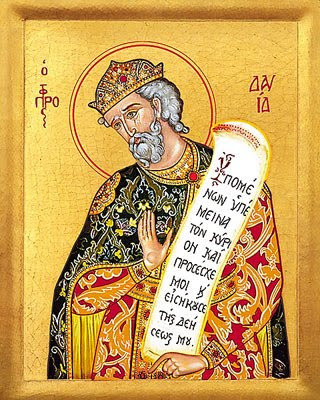Children reading from the Psalter

First Kathisma
David’s. Without Superscription among the Hebrews, 1.
Blessed is the man that hath not walked in the counsel of the ungodly, nor stood in the way of sinners, nor sat in the seat of the pestilent.
But his will is rather in the law of the Lord, and in His law will he meditate day and night.
And he shall be like the tree which is planted by the streams of the waters, which shall bring forth its fruit in its season; and its leaf shall not fall, and all things whatsoever he may do shall prosper.
Not so are the ungodly, not so; but rather they are like the chaff which the wind doth hurl away from the face of the earth.
For this reason shall the ungodly not stand up in judgement, nor sinners in the council of the righteous.
For the Lord knoweth the way of the righteous, and the way of the ungodly shall perish.
But his will is rather in the law of the Lord, and in His law will he meditate day and night.
And he shall be like the tree which is planted by the streams of the waters, which shall bring forth its fruit in its season; and its leaf shall not fall, and all things whatsoever he may do shall prosper.
Not so are the ungodly, not so; but rather they are like the chaff which the wind doth hurl away from the face of the earth.
For this reason shall the ungodly not stand up in judgement, nor sinners in the council of the righteous.
For the Lord knoweth the way of the righteous, and the way of the ungodly shall perish.
Recently I have begun taking my eldest son through the kathismata (see below). I set this practice up primarily so that we could have a set time to sit down together and discuss the foundational material found in the Psalms, but I also think it's a good opportunity for him to expand his reading comprehension as well as his penmanship. He copies it out from the green Holy Transfiguration Psalter, then we read it line by line with a discussion about the meaning of each with occasional questions from him on the meaning of a word.
His first response to me having him sit down in my office was to question why this was at all necessary. I asked him if it seemed reasonable for me to let him ride his bike without any instructions or a helmet. He said no. How about jumping into the pool without any lessons? Of course not. So then I asked him if it was reasonable for him to not be cognizant of God's commandments and yet be left alone to walk around unsupervised. He pondered for a bit and then said no.
As school begins on Monday I was glad that Psalm 1 proved to be apropos. It discusses dealing with people who act in an ungodly fashion as well as the blessings that fall onto those walk a righteous path. Certainly a timely topic as he makes new friends and is faced with new opportunities to grow in maturity. If other parents can find fifteen minutes to do the same, this has so far proved to be a worthwhile father-son bonding experience.
A short explanation of the kathismata from Wikipedia:
The 150 psalms were divided into 20 sections, called kathismata (Greek: καθισματα; Slavonic: каѳисмы, kafismy), meaning literally, "sittings". The name is derived from the fact that, in the Office as it developed in Jerusalem and Constantinople, the psalms would be read by one of the brethren while the others sat and listened attentively.
Each kathisma is further subdivided into three staseis (Greek: στασεις), literally, "standings", because at the end of each stasis (Greek: στασις) the reader says: "Glory to the Father, and to the Son, and to the Holy Spirit..." at which all stand in honor of the Holy Trinity.
Each kathisma is further subdivided into three staseis (Greek: στασεις), literally, "standings", because at the end of each stasis (Greek: στασις) the reader says: "Glory to the Father, and to the Son, and to the Holy Spirit..." at which all stand in honor of the Holy Trinity.

Comments
Post a Comment